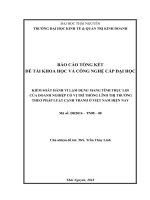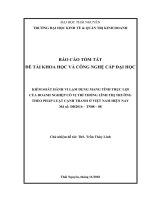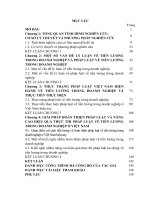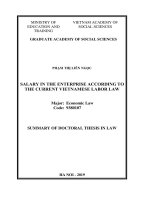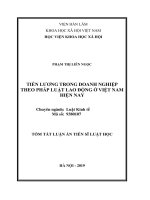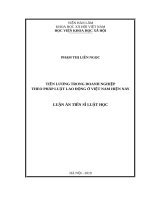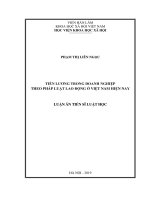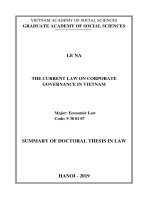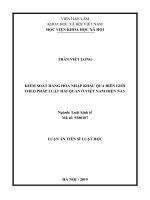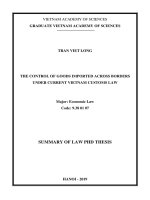Tiền lương trong doanh nghiệp theo pháp luật lao động ở việt nam hiện nay tt tiếng anh
Bạn đang xem bản rút gọn của tài liệu. Xem và tải ngay bản đầy đủ của tài liệu tại đây (250.85 KB, 27 trang )
MINISTRY OF
EDUCATION AND
TRAINING
VIETNAM ACADEMY OF
SOCIAL SCIENCES
GRADUATE ACADEMY OF SOCIAL SCIENCES
PHẠM THỊ LIÊN NGỌC
SALARY IN THE ENTERPRISE ACCORDING TO
THE CURRENT VIETNAMESE LABOR LAW
Major: Economic Law
Code: 9380107
SUMMARY OF DOCTORAL THESIS IN LAW
HA NOI - 2019
The thesis is completed at GRADUATE ACADEMY OF SOCIAL
SCIENCES
Supervisor: Assoc Prof., Dr. Nguyen Huu Chi
Reviewer 1: Prof., Dr. Hoang The Lien
Reviewer 2: Prof., Dr. Nguyen Thi Mo
Reviewer 3: Assoc Prof., Dr. Nguyen Hien Phuong
The thesis shall be defended in front of the Thesis Committee at Academy
Level at GRADUATE ACADEMY OF SOCIAL SCIENCES
At.......hour........date........month....... 2019
The thesis can be found at The library of Graduate Academy
Of Social Sciences and National Library
LIST OF PUBLISHED WORKS OF THE AUTHOR RELATING
TO THE THESIS
1. Pham Thi Lien Ngoc, “Perfecting the law on wages in
enterprises in Vietnam”, Journal of Democracy and Law,
edition July (316) in 2018, Section of Building legislation,
pages 23-26.
2. Pham Thi Lien Ngoc, “Law on wages and practical
application in enterprises”, Financial Journal, editon 682,
period 1- June 2018, Section of Enterprise finance, page 6668.
1
INTRODUCTION
1. Rationale
The enterprise salary plays an important role, has profound effects
not only on socio-economic issues in macro level of the economy but
also directly on employees' life and their family.
Over the years, the Party and the State have paid much attention to
the issue of employees' salary in enterprises by the promulgation of the
Labor Code, effective from January 1, 1995 with four times of
amendments and supplements in 2002, 2006, 2007 and 2012. In
addition, competent state agencies also have issued a lot of normative
documents that regulate the enterprise salary. Typically, there are
regulations on minimum wage, the principle of building payroll in
different types of enterprises. Those regulations initially have been
creating the legal basis for social relations on salary whose formation
and development according to the law of the socialist-oriented
economy, have been not only contributing to create fairness and
transparency in paying salary but also protecting employees’ rights.
However, besides changes and fluctuations in the labor market, the
social relations on salary are also growing more diverse. Enterprises can
easily use their specific reasons to set their own regulations on salary
that are causing disadvantages for employees, making difficulties for
the state inspection and supervision on payrolls and employees’ actual
payment, affecting badly the living standard of employees as well as
ensuring the deduction rate to social insurance, health insurance,
unemployment insurance, causing consequences in eco-social life.
In fact, over the time, there has not been any research to
systematically and comprehensively study this issue. Therefore, the
PhD students choose the topic “Salary in the enterprise according to
the current Vietnamese labor law” as a doctoral thesis with theoretical
and practical significance, contributing to improve the law performance
on enterprise salary nowadays.
2. Purposes and missions of the thesis
2.1. Purposes of the thesis
The purpose of the thesis is clarifying the theoretical and practical
2
basis of enterprise salary.
Therefore, the thesis assesses the practical issues of current legal
regulations and proposes solutions to improve the law on salary in
enterprises.
2.2. Missions of the thesis
- Re-systemizing the content of legal theory on enterprise salary.
- Evaluating the legal content of salary in enterprises, including the
advantages and limitations of the current legal regulations.
- Determining the direction and propose solutions to improve the
current legal regulations on enterprise salary.
3. Objects and scope of the thesis
3.1. Objects of the thesis
The object of the thesis includes the system of legal regulations
governing salary in enterprises: The Labor Code and guiding
documents, other relevant legal documents, scientific published
research related to the thesis topic.
3.2. Scope of the thesis
The scope of the research is the system of legal regulations
governing salary in enterprises generally. The thesis does not focus on
particular salary regulations of any enterprise.
The study period is determined from 2013 to 2018, with
comparisons and references to previous periods.
4. New scientific contributions of the thesis
The thesis has systematized and generalized the theoretical issues
about salary in enterprises and laws on salary; Pointed out the role of
the law on enterprise salary that are used as an important legal tool in
protecting employees; analyzed the current situation and shortcomings
of the law on enterprise salary and law enforcement mechanisms;
Proposed solutions to improve the law and law enforcement
mechanisms on enterprise salary in Vietnam.
5. Scientific and practical meanings of the thesis
About theoretical meanings, the thesis contributes to summarizing
the theoretical and legal issues of salary in enterprises, thereby the
thesis gives some scientific theory to complete the thesis topic.
3
About practical meanings, the thesis contributes to practical
evaluation, points out the advantages and limitations of legal regulations
and pratical situation of salary in enterprises. The results of the thesis
will provide the legal science a more general view, contribute certain
practical values to legal scientists and enterprises in legislation and law
application on the enterprise salary.
6. Structure of the thesis
The thesis includes introduction, 4 chapters conclusion,
recommendation, list of published works, references and appendix.
Chapter 1
OVERVIEW AND RELATED MATTERS ABOUT RESEARCH
1.1. Overview about research
1.1.1. Abroad studies
Group of studies related to salary in enterprise
Firstly, group of studies about salary under economic perspective
- Typical research in this perspective are: Textbook of Labor
economics of Prof., Dr. Pogosian GP and Prof., Dr. Giucop; The book:
Modern labor economics: Theory and public policy of Ronald G.
Ehrenberg , Robert S. Smith; States with Minimum wage above the
Federal level has had small business overcoming and retail job growth
of Fiscal Policy Institute,...
Secondly, the studies analized related contents of salary in some
perspectives: payroll, payment methods, minimum salary. Some typical
research: The effect of mininmum wage throughout the wage
distribution of Neumark; The Advantage Of The Minimum Wage of
Robert Nielsen,…;
Thirdly, those research and studies have shown that salary has
been a sentitive issuse to achieve the goal of building a progressive and
transparent labor market in the integration context, following the
formation of economic and political communities and labor mobility
between countries and regions. Some typical research in this
perspective are: The effect of mininmum wage throughout the wage
distribution of Neumark, D. and Wascher, W.; The tail of two countries:
4
Minimum wage and employment in United States and France of
Abowed,…
Group of studies related to legal provisions on enterprise salary
that are focused on some research: Theory and public policy of Ronald
G. Ehrenberg, Robert S. Smith, Rudolph J. Rummel, Understanding
Factor Analysis of Rudolph J. Rummel; ILO 2006: Minimum wages
policy, ...
1.1.2. Vietnamese studies
Firstly, published works and documents discussed and pointed out
characteristics of salary in economic perspective and emphasized the
need to adjust by law of salary issues in enterprises. Typically, the
topic: “Labor law on enterprise salary - some theoretical and practical
issues” by Le Thi Quynh Hoa and “Labor law on enterprise salary and
practical application in Hai Duong province” by Nguyen Manh Tuan.
Secondly, the studies interpreted and answered those questions:
Who has the right to decide on the payment of salary to employees in
each enterprise? How is the State's intervention in the issues of
enterprise salary? How effective is the tripartite mechanism in
negotiating and agreeing on salary issues? What are responsibilities of
representive organizations of the employees in negotiating, signing
collective labor agreements... Typical research: Current salary and
income policies in Vietnam by Mai Ngoc Cuong; Research on salaries
and income in non-state enterprises in Hanoi by Vu Hong Phong.
Thirdly, with the importance of salary in labor relations, some
studies suggested that there should be a legal valid document as the
Salary Law in legal documents system regulating the labor field.
Fourthly, the research related to examinating, monitoring and
evaluating the effectiveness of the application of labor laws on salary,
the rights and obligations of the parties in labor relations related to
salary issues.
1.1.3. Evaluating the research situation related to the thesis topic
Theoretically, those studies have basically raised some legal
arguments about the enterprise salary, but have not yet systematically
clarified the theory of salary in enterprises according to labor laws.
5
Practically, those research has raised many situations in each
aspect. However, there have not been any studies that overall evaluated
situation of the current situation of enterprise salary in Vietnam.
Relating to the solutions, few domestic studies have approached
under the perspective of labor law on salary. However, there has not
been a systematic study on this issue. Therefore, a comprehensive
research is needed about enterprise salary in current Vietnamese labour
law.
1.2. Theretical basis and research methods of the thesis
1.2.1. Theretical basis
1.2.1.1. Research theory
The thesis applied theory of business - labour administration
approach, management theory, general theory of salary management,
theory of human resource management.
The thesis researchs on the basis of the theory about roles of State
and Law in economy, the theory of the socialist rule-of-law state of
Vietnam, the theory related to labor law on salary.
1.2.1.2. Research questions, research hypothesis of the thesis
* Research questions:
Which theoretical and practical issues about salary in enterprises
according to labor law are studied and not studied or not clarified?
- What are the orientations and solutions to improve the salary
issue in enterprises according to labor law in the future?
* Research hypothesis:
The current theory and regulations current Vietnamese law do not
meet the requirements of the salary issues in enterprises; the practical
situation has many loopholes; the solutions to improve salary in
enterprises under labor law have not been studied systematically, deeply
and comprehensively.
1.2.2. Research methods
The PhD student used some methods such as: Methods of analysis
and synthesis, systematic methods, comparative law methods, specific
historical methods, methods of statistic, methods of expert interviews...
Chapter 1 Conclusion
6
Chapter 2
THEORETICAL AND LEGAL MATTERS
ON SALARY IN ENTREPRISE
2.1. Theoretical matters on enterprise salary
2.1.1. Concept of salary in enterprises
Under the perspective of enterprises, salary in enterprises are
understood as the amount that employers must pay to employees based
on productivity, quality, work efficiency and working conditions,
determined by agreement between two parties in labor relations and not
contrary to legal regulations.
2.1.2. The nature of salary in the enterprises
Firstly, the nature of salary in enterprises is expressed in its
economic perspective, that is the result of the negotiating and
exchanging labor goods that are provided by the employees in a period
of time; or the result of a product or service introduction that the
employees will receive an amount agreed with the employer. In market
economy, salary is dominated by the rule of value and the law of labor
supply and demand.
In social perspective, salary is also a guarantee for employees to
cover their life and family. Therefore, employees can also receive
allowances based on salary, bonus and welfare.
2.1.3. Factors affecting salary in enterprises
* Factors from labor supply and demand
* Factors from internal enterprises and employers
* Factors from employees
* Collective labor agreement on salary
* Factors from legal policies of the State
* Factors from international integration
2.2. Theory of law on salary in enterprises
2.2.1. Concept of law on salary in enterprises
Although salary is an economic factor that is put into the value and
cost of products by employers, the state needs to manage and monitor
salary in enterprises to protect employees who have lower position in
7
labour agreement as well as to ensure social objectives that are avoiding
exploitation, ensuring the reproducing and accumulating labor capacity;
The promulgation of legal regulations to state salary in enterprises
forms a legal framework on salary in enterprises, so that law on salary
is a combination of regulations issued by the State to determine rights
and obligations of parties in the field of salary and minimum salary; to
adjust principles for setting up a system of payrolls and labor norms.
2.2.2. Objects of law on salary in enterprises
Objects of law on salary in enterprises are legal relations on salary
in enterprises. There are 2 groups of objects:
First, legal relation on salary in enterprises between employees and
employers
Second, legal relation on salary in enterprises between employees
and employers with the State’s participation.
2.2.3. The basic principles of salary
* Salary in eneterprises is decided by employers
Based on the nature of corporate governance, business owners have
the right to determine the elements of business issues from which to
seek profits for business. The State does not interfere with the payment
of enterprise salary, but only promulgates principles to build salary
scales, payrolls, labor norms and supervises the minimum salary to
protect employees and ensure social security and safety
* Employee's salaries must be paid based on an agreement with
employers and base on productivity, quality and work efficiency but not
lower than the minimum salary stipulated by the State.
The nature of labor relations regulated by labor law is a free
agreement. In each enterprise, the salary agreement can be implemented
at different levels such as individual agreements through labor contracts
or collective agreement (collective labor agreement), including subcontracts allowances, bonuses,... are all agreed by parties in labor
relations. On the law basis, parties in labor relations, especially
employers, need to comply with the limits set by the State such as
minimum salary, payment principles, payment time... to ensure legal
valid for agreements between the parties.
8
* Principle of non-discrimination in the field of salary
Employers must ensure equal payments, regardless of gender for
the same valuable work of employees
2.2.4. Adjusting methods of law on salary in enterprises
- Method of agreement
- Administrative methods
- Combining method of agreement and administrative method
2.2.5. Contents of of law on salary in enterprises
Minimum salary
The minimum salary is understood as the lowest amount to pay
employees to do the simplest work in normal labor conditions and must
ensure the minimum living needs of employees and their families.
The minimum salary has the effect of reproducing simple labor
power, ensuring the minimum demand and re-manufacturing of labor.
The minimum salary is regulated by the State, which is mandatory for
both parties in labor relations, which means that the minimum salary
cannot be lowered by both employers and employees.
The minimum salary has sone characteristics such as: it is paid for
a labor at the simplest level, for the lightest labor intensity, for the labor
takes place under normal conditions; The minimum salary must ensure
the minimum consumption demand for employees and their families;
The minimum salary is determined by the cost of living in the region
with the average cost of living.
Usually there are two types of minimum salary: minimum regional
salary and minimum salary in industry sectors.
The Convention No.131 in 1970 of the International Labor
Organization (ILO) noted that: The elements to be taken into
consideration in determining the level of minimum wages shall, so far
as possible and appropriate in relation to national practice and
conditions, include: a) the needs of workers and their families, taking
into account the general level of wages in the country, the cost of living,
social security benefits, and the relative living standards of other social
groups; b) economic factors, including the requirements of economic
9
development, levels of productivity and the desirability of attaining and
maintaining a high level of employment.
The minimum salary plays an important role in the labor law
system. Most countries in the world have law to adjust this issue.
Principles of building wage scales, payrolls and labor norms
* Wage scale: The wage scale is a correlation rate of wage between
the skilled workers and others who work in the same profession or a
group of occupations with clear technical standards.
* Payroll: Payroll is a correlation rate of wage between employees
in the same industry according to the levels, work experience or actual
work undertaken by the employees.
* Labor norms: Labor norms are the regulation set by enterprises
in terms of quantity and quality of products corresponding to a certain
amount of labor time, applied to each group of laborers, certain working
groups within specific scopes.
Allowance and supplementary salary amount
Allowance is a component of salary which has additional effects,
helps improve the employee's salary. The allowance regime may be
agreed by both parties or fixed by the employer, recorded in individual
labor contracts or collective labor agreements. There are a number of
allowances: responsibility allowance, toxic allowance, working
seniority allowance, ...
* Payment methods
- Payment methods by time
- Payment methods by products
- Payment methods by stock salary
- Other provisions on salary payment in some special cases
* Salary deduction
The employer can only deduct the employee's salary to compensate
for damage caused by employees to the employer's tools and equipment.
Employees have the right to know the reason for deducting their salary.
Monthly deduction of salary cannot exceed a monthly percentage of
employee's income after deducting compulsory social insurance, health
insurance, unemployment insurance and income tax.
10
* Rights and obligations of employers and employees in term of
wages
- Employers: Labor relations are formed and maintained in the
form of labor contracts, in which the rights and interests of the parties
are agreed by the parties on the law basis. Employers, as owners and
capital investors as well as employers and users of labor, have rights to
decide income distribution in enterprises such as the right to build
payroll system, labor norms, wage regulations and salary allowances...
- Employees: Employees must comply with the regulations of
employers in the field of salary such as salary scales and payrolls
suitable to their professional qualifications; being assigned appropriate
labor norms; being paid directly, fully and on time; knowing the reason
for all wage deductions, having right to receive advance salary...
Chapter 2 Conclusion
Chapter 3
PRACTICAL REGULATION AND APPLICATION
ON SALARY IN ENTERPRISES
UNDER CURRENT VIETNAMESE LABOR LAW
3.1. Salary in enterprises under current law
3.1.1. Law on the basic principles of salary
The basic principles of salary which are recorded in the law on
salary are the the foundation for applying law of labor relations. These
principles are all aimed at creating fairness and protection of employees
in the weak side of relationship with employers.
3.1.2. Law on the minimum wage
In market economy, wage is adjusted through negotiations,
between individuals or collective of emplyee with employers. In
Vietnam, the basic criteria to determine the minimum wage is the
balance of labor supply and demand, the economic capability of
employers, cost of living index, inflation,...
The National Wage Council has a regular duty to provide a
minimum wage for employees. The mechanism to establish regional
minimum wage is based on national three-party bargaining on market
11
principles, through the results of negotiations and recommendations of
the National Wage Council.
3.1.3. Law on wage scales and payroll
Employers are responsible for building salary scales, payrolls, and
labor norms as a basis for recruitment, employment and agreement on
the salary stated in labor contracts and salary for employees. The
employer needs to consult the representative organization of the
employee at the establishment, publicly announce it at the employee's
workplace. After that, send a notice to the competent management
agency at the district level, where the business and production
establishment of the employer is located.
The construction of wage scales, payrolls and reasonable
determination of allowance levels must be derived from different
characteristics in each industry and in each specific working condition.
3.1.4. Law on building labor norms
Some principles to build labor norms: Implementing for each step
and each stage in job and the whole process of product production;
Building on the level of work or title; Labor level must be an advanced
average, ensuring that the majority of employees can perform it; The
new labor level must be tested before being officially issued;
Periodically reviewed and evaluated to modify, supplement and adjust
accordingly. When formulating or adjusting labor levels, enterprises
must consult the organizations representing the collective of employees
in enterprises and make public at the employees' work places and send
them to competent management agencies.
3.1.5. Other regulations about salary
* Salary allowance
The regulation of many allowances are leading to the allowance a
relatively large proportion of the total income of employees, reducting
the importance of salary. Therefore, from the Party and the State’s point
of view, especially the Resolution No. 27/2018 of the Party requires the
agencies to conduct research to review and amend the legal provisions
on wage allowances in which the total number of salary allowances
does not account for more than 30% of the employee's total income.
12
* Bonus
The bonus regime for the production area is very diversity in form.
Bonus fund is created from many sources: Business production
efficiency, good performance of economic contracts, product quality...
Bonus regime for employees includes many modes: completion of
norms with high quality products, material saving...
* Payment when employees stop working
This regulation a legal corridor to resolve conflicts about salary
when employees have to stop working due to subjective or objective
reasons. However, still having to pay salaries easily leads to losses for
employers, so it is necessary to have regulations that are agreed between
employees and employers.
* Payment when employees work overtime
Some regulations are unreasonable, especially in the field of labor
with fixed norms, is calculated in advance, if applied, it will lead to
production costs and reduce competitiveness of products or decline in
profits of employers. This requires regulations for specific sectors.
* Payment in leave regime
Enterprises often apply the calculation from the minimum wage
multiplied by the employee's coefficient of benefits, leading to the fact
that the actual amount is much lower than that of the employee when
working normally. This makes employees not interested in long-term
leave, but focus on short vacations for reasons of personal reasons.
* Payment through contractors
In fact, there are cases where employers do not directly manage,
use and pay wages to employees, which are performed by contractors. If
the contractor does not pay wages and other benefits to employees, the
main employer must be responsible for paying wages and ensuring such
benefits for the employees. The employer has the right to ask the
contractor to compensate in accordance with the legal regulations.
* Advance salary
Under the provisions of Article 100 of the Labor Code 2012,
employees are entitled to have advance salary in case: (1) Employees
are paid in advance according to the conditions agreed by the two
13
parties; (2) Employers must pay advance salary corresponding to the
number of days employees temporarily leave to perform their civic
obligations from 01 week or more but not exceed 01 month's salary and
must repay the advance amount unless perform military service.
3.2. Practical implementation of the law on wages in enterprises in
Vietnam recently
General assessement
The average income of employees increased steadily over the
years, by the fourth quarter in 2016, it reached 5.08 million VND, of
which male reached 5.24 million VND and female reached 4.85 million
VND. The salary in public sector gradually improved, State’s
enterprises were given more autonomy in managing labor; income and
bonuses for employees and managers; clearly assigning responsibilities
of enterprises, controllers, owners and management agencies in
monitoring and inspecting wage regime and bonuses of enterprises;
supplementing regulations on publicity in terms and bonuses; salaries
associated with labor productivity and production efficiency, ensuring
the autonomy of enterprises in determining and paying salary for
employees.
The Labor Code has determined the basic principle of salary
payment for employees according to agreement principles. Besides,
there are guiding documents to protect employees’ salary.
However, the management on salary in enterprises still has some
problems. The rate of enterprises implementing the building and
sending salary scales and payrolls to local labor management agencies
is still low: foreign invested enterprises are about 30%, private
enterprises are about 10%. The formulation and amendment of payroll
scales; regulations on salary payment, bonus payment, salary increase
for employees are still slow. Many enterprises set up a salary scale for
many levels, separating salary into many allowances, subsidies and
other supplementary amounts to escape social insurance premiums.
Some enterprises stipulate criteria for salary increase, allowance for
benefits, allowances and bonuses which are complicated and difficult
for employee to monitor and supervise their performace.
14
Mechanism of adjusting wage in enterprises with 100% stateowned capital, enterprises with state-owned shares is ineffective, has
not created motivation for enterprises to do business effectively and
have not controlled well the labor costs in losing businesses: Salary of
managers of state-owned enterprises is too high while business
performance of enterprises is low; The stipulation of wage scale for
state managers according to the relationship of administrative area,
while employees follow the wage scale by construction enterprises,
which leads to the same enterprise, income to calculate social insurance,
salary of the retired employees may be higher than the manager.
* Strikes are mainly caused by low wages:
According to statistics from the Ministry of Labor, Invalids and
Social Affairs, in 2017, the country had 314 strikes and collective
cessation. The main reason is the minimum wage and labor norms.
Employees are paid improperly, the wage are still low or owed;
employers are not paid bonuses, along with working conditions and
extreme intensity of labor. Many businesses have adjusted the minimum
regional wage but cut, reduced subsidies and allowances, so the income
of some employees is basically not improved.
3.2.1. The minimum wage
In Vietnam, the National Wage Council has a regular duty to
provide a minimum wage for employees. Since its establishment, the
Council has 6 times successfully held negotiations and the adjustment
level announced by the Government is also the level recommended by
the Council (the average level in 2014 increased by 15.4%; in 2015
increased by 14.2%, by 12.4% in 2016, by 7.3% in 2017, 6.5% by 2018
and by 2019 by 5.3%). The minimum wage is determined by region in
accordance with natural characteristics, economic and social conditions,
policies to attract investment and develop labor market of the region and
the country.
The process of adjusting the minimum wage increases gradually in
accordance with the social economic conditions, the payment ability of
enterprises (especially small and medium-sized enterprises), contributing
to ensuring employees’ life, stabilizing the labor market and labor
15
relations in enterprises. The minimum regional wage in 2018 is from
2,760,000 to 3,980,000 VND per month (about USD 121 to 175 per
month) that ensures competitiveness in attracting investment compared
to other countries in the region (higher than Laos, Cambodia, and
Myanmar). The actual salary payment of enterprises for employees is
not low in comparision with the minimum wage announced by
Government. Many businesses have set labor norms, scales, payrolls and
appropriate forms of salary payment, creating a driving force to promote
production, business development, contributing to ensuring employees'
life.
However, the law on minimum wage has revealed some
limitations:
Legalization of minimum wage has not been specific and
completed, especially the determinants of the new minimum wage
mainly emphasize the minimum living needs of employees, the lack of
elements of labor market, production, business and competitiveness of
the economy. Currently, the minimum wage is still low, not ensuring
the minimum living needs of employees, causing much frustration for
employees. The low minimum wage is a huge implication for the
implementation of employee welfare policies such as sickness,
maternity, unemployment, overtime pay... Employers often base on the
minimum wage to sign labor contracts, paying wages, and deducting
insurance for employees close to or far less than the regional minimum
wage. This situation will lead to very low social insurance and pensions
of employees, failing to ensure life when they retire. However,
paradoxically, enterprises in Vietnam are mainly small and medium
scale, low labor productivity, if they quickly adjust to ensure the
minimum living needs of employees, many businesses will face
difficulties and reduce capacity, lose their income, the labor market is
unstable. It is very difficult to reconcile interests between the parties.
Taking the base of district administrative area to divide into 4
regional wages by the Government is irrelevant and fragmented. There
is not minimum wage set by the hour, so the minimum rate does not
cover and protect employees who do not work full-time; the
16
composition, functions, and operational mechanisms of the National
Wage Council are still limited and need to be further improved in
accordance with the integration process and participation in
international agreements.
The implementation has not been synchronous and widespread, the
private sector and cooperatives mainly have lovw rate of minimum
wage. Employers do not want to adjust the minimum wage increase, the
employee itself is not fully aware of their rights.
The promulgation of the Decree on the minimum wage of the
Government is still slow, leading to the implementation of guidelines
for implementation to slow establishments, making businesses passive
in developing annual minimum wage. State management on the
implementation of the minimum wage regime is still limited; the impact
assessment has not been carried out when adjusting the minimum wage
level, especially in checking and monitoring the minimum adjustment.
Collective bargaining in the minimum wage and wage in enterprises is
low; almost enterprises have not reached an agreement on higher
minimums than regulated.
The sanctions for handling violations in the implementation of the
minimum wage are not strong enough, the lack of measures and
monitoring mechanisms lead to the tendency to force the employee’s
wage to close to the minimum wage, affecting the employee's interests
as the main cause of leading to labor disputes and strikes.
3.2.2. The principle of building salary scales and payrolls
Salary scales:
Because the labor market in Vietnam has not yet completed, the
agreements on wage have not really taken effect, the State has stipulated
a number of general principles for enterprises to build ladders and
tables, contributing to limit the situation of wage pressure. Therefore,
employee benefits are more secure. However, the gap between the
salary levels in the salary scale of enterprises is not clear, confusing and
inadequate. The Government stipulates the principle of building
payrolls that interfere with the structure of payrolls of enterprises,
17
leading to discouraging salary by job but mainly by seniority, making
businesses do not want to use labor with many seniority
Payrolls
The system of salary scales and payrolls of all types of enterprises
shows that the wage scale is almost the same. However, for the
equitized enterprises from the previous state-owned enterprises, there
has been more progress, that is, there are three types of wage scales:
Applied to laborers with unskilled education; Applied to trained
laborers from intermediate or higher; Applied for high-level labor is
attractive, encouraging laborers with high experience.
The salary scale in enterprises is only calculated by multiplying the
minimum salary set by the State and then calculating the payable
regime of employees for compulsory or voluntary funds stipulated by
the State such as social insurance, security Health insurance,
unemployment insurance... This also leads to the fact that the actual
income of the employees is high, but the contribution to the funds is
low, making the future payment is.
3.2.3. The principle of building labor norms
Labor norms are a matter of great concern of the State, through the
regulation and control of labor norms for a number of labor and
employment sectors, the State also closely monitors the labor norms set
by internal regulations of enterprises. On the basis of stipulating the
principles and bases for building labor norms, the State has contributed
to minimizing the imposition and even exploitation of labor force of
employees. However, in fact, there are still some enterprises, the
application of high labor norms to employees is still very sophisticated
and complicated. Although the minimum wage is still applied, some
enterprises create certain difficulties for employees, which are building
labor norms too high, with strict conditions to make employees spend a
lot of effort; only working overtime can meet the minimum wage if the
employees want to increase income. Therefore, the state management
agency should issue effective regulations and implement strict
monitoring to end this situation.
Chapter 3 Conclusion
18
Chapter 4
SOLUTIONS TO COMPLETE AND IMPROVE EFECTIVENESS
OF LAW APPLICATION ON SALARY IN ENTERPRISES
IN VIETNAM
4.1. Perspectives of wage reform and improvement of the law on
wages in enterprises in Vietnam
4.1.1. Directions
First, institutionalize the guidelines of the State and the Communist
Party on developing a healthy, progressive labor market, protecting the
rights and interests of parties in labor relations.
Second, in the process of improving the legel system on wage in
enterprises, it is necessary to inherit and increase the legal status of
existing regulations in order to make the law to become a main legal
instrument for related entities to enforce their rights and obligations,
ensure democracy inseparable from the State's management.
Thirdly, the Party and State determine that the establishment of a
separate legal framework to adjust the salary in enterprises is a difficult
but certain process to be carried out.
4.1.2. Objectives to build and improve the law
First, creating a high, synchronous and unified legal basis for
salary in enterprises based on the inheritance of relevant laws and
regulations; supplementing ongoing issues in practice needs to be
adjusted to a suitable level by law under the management of the State.
Secondly, delineating and clarifying the functions, powers and
obligations of employers, employees and the State in the mechanism of
three parties in salary relation in enterprises.
Third, overcoming the state's intervention and designation in the
negotiation process of the tripartite mechanism to ensure democracy.
Fourth, the law must be the official means of adjustment and
recognition of the parties' agreements.
4.1.3. Requirements for improving the law on wages in
enterprises in Vietnam
Labor commodity prices in Vietnam still have many shortcomings,
directly impacting on the lives of employees and social life. They are:
19
the regulation of the minimum industry sector is inadequate, the
sanctions are not strong enough; the system of salary scales and
allowances have not yet fulfilled its role, etc. Therefore, it is necessary
to build a good law system on wage, because it relates to the income
and life of employees and affects directly to the business, to the
relationship of accumulation and consumption, the relationship between
the working class. In particular, satisfactory wage also helps minimize
conflicts of interest and strikes in enterprises, keeping the investment
and business environment stable.
4.1.4. Some orientations to improve the law on wages in
enterprises
Continuing to improve the law following the socialist orientation,
ensuring equality between different types of businesses, regardless of
economic sectors and types of enterprises, and clearly defining the role
of the State and parties in labor relations, ensuring the employee's
income in enterprises to reflects the true and is formed on the basis of
agreement between employees and employers.
4.2. Some recommendations to improve the law on wages in
enterprises
4.2.1. Perfecting the legal structure of wages and issuing the Law on
wages in enterprises
* The structure of legal forms in enterprises: It requires a system
of rules to adjust this content fully, uniformly contained in legal
normative documents and issued in a certain procedures by competent
state agencies.
* Content structure of the law on enterprise wage: The content
structure of the law on wage in enterprises requires that the rules must
identify social relations, issues related to wage in enterprises of
importance weight needed to adjust by law.
* Issuing the Law on wages in enterprises
In order to accelerate the democratic process in all aspects of life,
including labor relations, to promote the ability to criticize policies, to
promote and strengthen labor relations, it is necessary to include the
draft Law on wages in enterprises in the agenda of the National
20
Assembly and need to approve and issue this document, creating a legal
basis for the problem in enterprises to become a content with a great
role and an important contribution to the construction a healthy and
transparent labor environment.
Proposal: The National Assembly studies and approves a legal
normative document with the name: "Law on wages". In particular, it is
necessary to specify the contents: the scope of adjustment of the Law on
wage in enterprises, the subjects of adjustment of the Law on wage, the
rules of organizational principles, the provisions on the basis of building
wage scales, payroll, labor norms, regulations on the basis of building
and adjusting the minimum wage, regulations on composition and
activities of the National Wage Council...
4.2.2. Amending the concept of wages in the Labor Code 2012.
Salary structure should not be divided but only be stated according
to the nature is the amount agreed by the employer and the employee to
pay the employees to perform the work as required by the employer,
specifically as follows: “Salary is the amount of money that employers
pay to employees to perform the work according to the agreement”.
This amendment of the concept of salart as above will contribute to
minimize the confusion when identifying the types of money in the
structure of employees' salary.
4.2.3. Amending some principles to build wage scales and payrolls
Enterprises are now losing a part of autonomy in business
production when the construction of salary scales and payrolls must
follow the principles set by the State. In some enterprises, building
salary scales and payroll has only sanctioned meaning when the
enterprises are inspected.
In addition, it is stipulated that employers must consult the
organization of collective labor representatives when building salary
scales and payrolls which is inappropriate due to the establishment of a
mechanism in the enterprise which is the right of employers. In fact, the
salary in the salary scale and payroll is only a basis for employees and
employers to agree on the salary stated in the labor contract. Therefore,
it is recommended to abandon the requirement of participation of the
21
organization of the labor collective faction when building salary scales
and payrolls.
4.2.4. Studying and issuing guidelines on construction of labor
norms
Labor norms contribute to boosting labor productivity. However,
the construction of labor norms is too high may cause workers to be
exhausted labor. Therefore, employees themselves must also participate
in research and contribute ideas, propose to participate in building
appropriate labor norms in enterprises, where they participate in labor
relations.
4.2.5. Amending, supplementing and perfecting a number of
legal regulations closely related to wages in enterprises
Reviewing legal normative documents such as Labor Code,
Enterprise Law, Law on Government organization, Law on
Organization of Local Government, Decrees on organization and
operation of units, ... to find out the irrationalities of the work for
employees under the labor contract mechanism, from which there are
plans to adjust those regulations accordingly.
4.3. Proposals to improve the efficiency of labor law enforcement on
wages in enterprises
4.3.1. Solutions for wage reform in enterprises
Adjusting the regional minimum wage in accordance with the
requirements of socio-economic development, the ability of businesses
and the living standard of the employees to ensure the minimum living
standard; Gradually reducing the State's direct intervention on the issues
of enterprises; Managing labor force in state-owned enterprises by the
method of allocating cost of goods associated with the targets of
production and business tasks of enterprises; stipulate the minimum
wage, which is the lowest floor level set by the State as a basis for
employees and employers to agree to pay wages.
In addition to the current monthly minimum wage, supplement the
hourly minimum wage (for employees who have unstable and part-time
work) to meet labor market development requirements in the industrial
revolution 4.0.
22
Regulating the relative independent role of the National Wage
Council with state management agencies on advising, recommending
the minimum wage. Adding independent members to the organizational
structure and composition of the National Wage Council in accordance
with ILO Conventions and international practices.
Regulating measures to ensure minimum wage enforcement.
Salary management mechanism: Gradually reducing, gradually
eliminating the direct intervention of the State so that enterprises (including
state-owned enterprises) are allowed to decide on policies and pay salary in
accordance with the production organization, labor, ability of enterprises and
publicity at work place for employees to supervise.
The State announces the minimum wage (by region, by hour) and
supported the provision of labor market information for businesses and
employees to negotiate agreements, sign labor contracts and pay wages
associated with productivity and labor results. Enterprises and representative
organizations of employees participate in negotiation, agreement on salary,
bonus and other regimes in enterprises
4.3.2. Continueing to reform the minimum wage policy
The regional minimum wage should take into account the
difference of the factors that govern the minimum wage applicable to
different types of businesses. So the agencies developing law on wage
need to adjust the salary level applied to the regions appropriately.
When the minimum wage increase must be based on the laws of supply
and demand, market value and competition, the minimum wage
increase must be periodically. In addition, the wage increase must
depend on the conditions, areas and working environment.
The minimum wage by sector is the basis for paying employees in
specific sectors. In order to encourage key industries in economic
development, in addition to creating a favorable legal environment, it is
necessary to create a gap in minimum wages between sectors. In order
to accurately determine the industry's minimum wage, it is necessary to
base on the following factors: Minimum wage level, working standard,
agreement ability of employees in each industry and the importance of
that industry in economy.
